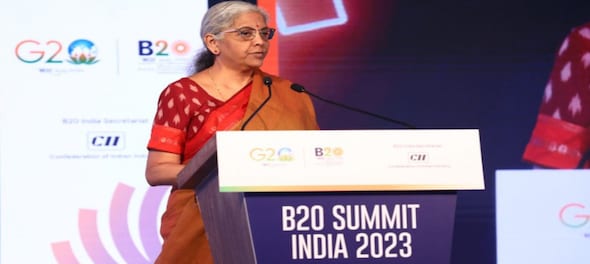
In the run-up to the highly-anticipated G20 Summit, Union Finance Minister Nirmala Sitharaman has outlined five key priorities for global economic growth during a press conference at the B20 Summit on Friday (August 25). The finance minister expressed her views on a range of economic issues, from inflation control to climate change finance — highlighting India's stance on these critical matters.
1. Taming inflation and monetary policy strategy
Sitharaman emphasised the importance of taming inflation as a critical priority for global economic stability. She mentioned the anticipation surrounding the US Federal Reserve's upcoming decisions, and warned against the negative impact of persistently high inflation on demand. She cautioned against relying solely on interest rates to manage inflation, stressing the significance of addressing supply side issues as well. She also stressed that central banks should consider growth-related priorities alongside inflation control.
"My top priority would be to tame inflation, as it is absolutely critical. There are high expectations regarding what the Fed is going to communicate. Persistently high inflation can weaken demand. Maintaining elevated interest rates for a prolonged period can have negative impacts. Relying solely on the interest rate as the tool to manage inflation will not provide a complete solution; supply side issues will inevitably arise."
2. Fiscal discipline and investment promotion
The finance minister pointed out that fiscal deficit control is essential for effective inflation management. She urged countries to maintain fiscal discipline and create a conducive environment for investment. She shared India's commitment to raising investments, initially supported by the public sector, until the private sector becomes more involved. She noted the government's focus on enhancing basic amenities and infrastructure.
"The task for central banks is to consider growth and growth-related priorities, even while keeping inflation in check. The fiscal deficit needs to be controlled; otherwise, inflation cannot be brought under control. Sure shot routes to investments need to be supported by public’s sector till private sector steps in. The government is persistently seeking higher investments, which is the best solution," she said.
3. Public health, Eeducation, and sustainable growth
Sitharaman underscored the need for focusing on public health and education as key drivers of sustained economic growth. She warned that neglecting these areas could lead to future health crises. She advocated for increased public expenditure in these sectors, acknowledging that post-pandemic economic challenges might limit the capacity for capital investment.
"The labour force participation will need to be increased. Post-pandemic, only a few countries will have the capacity to raise public expenditure for capital, but this will be necessary. Giving priority to public health and education is crucial for sustaining growth. We will have a health crisis unless this is done; health has to be kept up in a very dynamic fashion," Sitharaman said,
4. Climate change finance and global collaboration
She highlighted the urgency of climate change finance as a priority for sustaining global growth. She acknowledged the shortfall in the promised $100 billion for climate financing and emphasised the need for international collaboration. She pointed out that transitioning to cleaner technologies would require significant investments and called for a global effort to support such endeavours.
"Climate change finance is a key priority to sustaining global growth. The promised $100 billion has yet to materialise on the table; only a few countries, including India, have funded their commitments outlined in the Paris Agreement using their domestic resources."
"For India, the transition period will pose a significant challenge if it has to be accomplished independently. Adequate funding is required for technology adoption and facilitating the transition. This endeavour must be a global collaborative effort," she informed.
5. Diversification of supply chains and Atmanirbhar' Bharat
Sitharaman stressed the importance of diversifying supply chains to cushion against economic shocks. She mentioned India's commitment to Atmanirbhar Bharat (self-reliant India) and stated that the country needs to protect itself from potential disruptions in the global supply chain. She noted the government's efforts to encourage domestic manufacturing and reduce dependence on imports.
"The diversification of supply chains is of utmost importance; we cannot afford to endure another shock. We need to cushion ourselves against any potential disruptions. India is anchored on Atmanirbhar Bharat, which emphasises self-reliance. However, this doesn't mean we are discontinuing necessary imports."
"Our goal also involves reducing the burden of compliance. Through PM Gati Shakti, we are receiving layers of information regarding existing obstacles. The semiconductor mission, backed by an outlay of Rs 76,000 crore, is expected to pave the way for India's significant presence in the global electronics value chain."
During the press conference, Sitharaman also provided insights into India's ongoing initiatives. She highlighted the efforts to reduce compliance burdens, improve foreign inflow regulations, and promote public-private collaborations.
She pointed to the progress on trade agreements, including discussions with the UK and ongoing negotiations with Canada. The finance minister concluded by expressing her confidence in the resilience of the Indian economy, citing democracy, a growing youth population, and an investor-friendly environment as factors contributing to India's economic strength.
(Edited by : Shoma Bhattacharjee)
Check out our in-depth Market Coverage, Business News & get real-time Stock Market Updates on CNBC-TV18. Also, Watch our channels CNBC-TV18, CNBC Awaaz and CNBC Bajar Live on-the-go!


Supreme Court says it may consider interim bail for Arvind Kejriwal due to ongoing Lok Sabha polls
May 3, 2024 4:57 PM
10% discount on fare on Mumbai Metro lines 2 and 7A on May 20
May 3, 2024 2:40 PM

